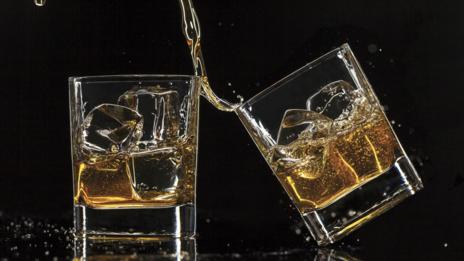
A review of previous research published in 2000 confirms that the causes of the main symptoms of hangovers are dehydration, changes in the levels of hormones such as aldosterone and cortisol, and the toxic effects of alcohol itself.
In addition there’s evidence that the immune system is disrupted and that this could be the cause of the headache, the nausea and the fatigue.
The first of the two main ingredients of a drink that affect the severity of a hangover is obvious. The higher the alcohol content, and the faster you drink it, the worse the hangover. This is however just an average. The same quantity of alcohol does not always result in the same severity of hangover.
Many report that they don’t get hangovers and no one quite knows why. In a study of young Danes on holiday, almost a third of those who consumed at least 12 units of alcohol (roughly equivalent to four pints of lager or four 250ml glasses of wine) avoided hangovers.
To find out the effect of these substances on hangover severity, researchers in the US recruited university students who were regular drinkers, without alcohol problems. On different nights they were given either bourbon and cola, vodka and cola or a placebo which consisted of cola mixed with tonic, with a few drops of either bourbon or vodka to make it taste similar to the real stuff.
They drank anything between three and six drinks, however much was enough to give them a concentration of 0.11g of alcohol per 100ml of breath. This would put them two to five times over the drink drive limit, depending which country they were in.
They then spent the night in the clinic and were woken at 7am for breakfast before taking part in a battery of tests. For this they were paid a rather generous $450. The researchers found the students who drank bourbon rated their hangovers as worse, but interestingly they performed just as well on tasks such as reaction time tests.
Clear drinks such as white rum, vodka and gin tend to cause fewer and less severe hangovers because they contain relatively low levels of congeners. Perhaps those who mix their drinks are more likely to choose a dark-coloured drink containing higher levels of these substances simply by virtue of their wider drinking range, but again it isn't the mixing in itself that causes the problem.
No scientist seems to have done the perfect counter-balanced study where people are randomly assigned to drink beer followed by wine or wine followed by beer. But perhaps it’s not the grape or the grain that matters, but the effect that the strength of those drinks has on judgement. Beer is only between a third and half the strength of wine, so starting on it leads to less intoxication if followed by the stronger stuff.
But if a person starts on wine or spirits, then their judgement may be impaired enough to drink more heavily later. There’s certainly evidence that people are not good at judging their own drunkenness. At low levels people overestimate the amount of alcohol in our blood, but after a few drinks they start to underestimate it.
So, the existing evidence suggests that hangovers can't be blamed on mixing drinks. It's probably down to the high congener count of the booze, or over-drinking. As for hangover cures, scientists have looked into those too, and the British Medical Journal published a review of trials of everything from borage to artichoke and glucose to prickly pears in 2005. The bad news for drinkers is that none of them work.
Culled From BBC
No comments:
Post a Comment